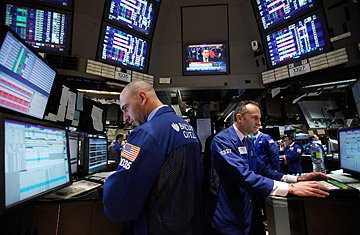
The New York Stock Exchange
As U.S. corporations struggle to navigate volatile equity markets and an uneven economic recovery, one financial idea seems to be gaining appeal. Many companies believe their shares are so undervalued that they make for better investments than new plants and equipment. Companies have announced massive buyback programs this year, and the stock market's 8.2% decline in May will likely keep the action coming.
"It's one of the top three topics that we're talking to clients about right now — it is all the rage," says Carsten Stendevad, head of Citi's Financial Strategy Group, which services corporate clients. "Companies are coming out of the crisis and need to find EPS (earnings per share) growth. They've already focused on cost cuts over the past 18 months — and there's not a lot of additional cost cutting to be had," he says. When companies buy back shares, they shrink the number of shares outstanding, and that gooses earnings per share. Says Stendavad, "There's not a lot of topline growth, ... and share buybacks are a very convenient way to grow EPS."
So far in 2010, U.S. companies have announced plans to repurchase $150.6 billion in stock, up eight-fold from $19 billion during the same period in 2009, according to Dealogic.
The companies announcing the largest buybacks this year have been Pepsico, Philip Morris International, IBM, Lowe's Cos., ConocoPhillips, Gilead Sciences, United Technologies Corp., WellPoint Inc., DIRECTV Group Inc., and Devon Energy, according to TrimTabs Investment Research. Lowe's and Pepsico's programs represented the largest percentage of their total shares outstanding, with both at 14.6%.
The benefits of buyback programs are threefold: First, they reward shareholders by propping up shares when the market is declining; then there's that nice boost to earnings per share; and third, they can offset the dilutive effects of stock options that are exercised as part of executive compensation packages.
Another reason buybacks are surging is that managements have the money to do it. Companies in the S&P 500, excluding financials, held $1.01 trillion in cash at the end of the first quarter, up from $811 billlion at the end of the same quarter a year ago, according to Howard Silverblatt, senior index analyst at Standard & Poor's. This cash represented 10.6% of total assets, up from 9.2% in the first quarter of 2009. This excess cash equates to about 74 weeks of expected net income, says Silverblatt. "That's 74 weeks of net income sitting in the bank not earning a lot — that's a big asset."
The U.S. companies with the biggest cash holdings right now (excluding financials and auto companies that received government bailouts), and therefore likely candidates for active buyback programs, are General Electric, Microsoft Corp., Cisco Systems, Google Inc. and Apple Inc.. Tech and pharma companies have particularly high levels of cash on their books.
Buybacks may be surging lately, but they have long been a tool for propping up EPS and rewarding shareholders. "If you look at the 100 largest companies in the U.S., about one-third of their EPS growth between 2003 and 2008 — pre-crisis — came from share buybacks," notes Stendevad.
Of course, companies can choose to do other things with their excess cash, such as hiking the dividend. But this strategy is not as popular as buyback announcements. One reason is that dividends are taxable distributions to shareholders. Also, dividend hikes effectively commit managements to paying out that improved dividend each and every quarter, even if business turns bad. "The worst thing you can do, if you're a dividend paying company, is to have to announce you're reducing the dividend or temporarily suspending it," says Chuck Hill, chief market strategist at First Coverage. Buybacks, in contrast, can be started, suspended, then restarted without much ado.
Devon Energy unveiled a $3.5 billion buyback program in May, which will involve purchasing up to 11.8% of the company's shares outstanding over the next 18 months. The company had halted its buyback program in late 2008 "as we saw the world coming to an end," says Jeff Agosta, chief financial officer of Devon. However, the company is currently selling some of its offshore businesses as part of a strategic restructuring that's expected to net the company $8 billion, and Agosta believes the proceeds would be best spent paying down debt and rewarding shareholders with a buyback program.
"We think it represents excellent value," says Agosta, pointing to the fact that the stock market places a very low value on Devon's proven reserves of oil, which makes the stock attractive. "Right now, oil costs about $70 a barrel on the commodity market — this share buyback allows us to buy our barrels back for $10," he says.
S&P's Silverblatt expects executed buybacks to total more than $200 billion this year, up from $137.6 billion last year.
